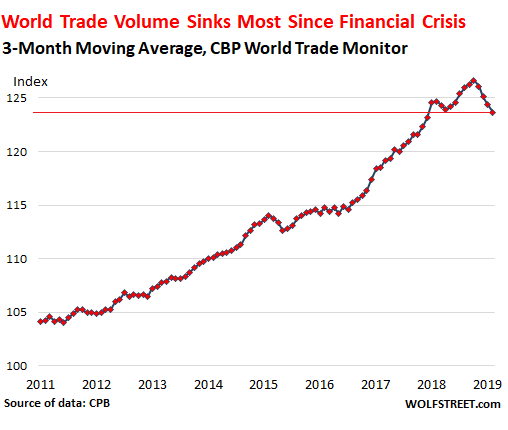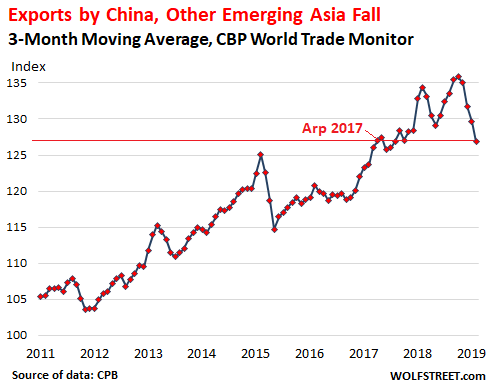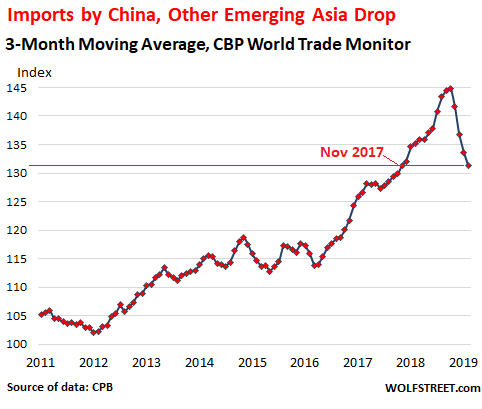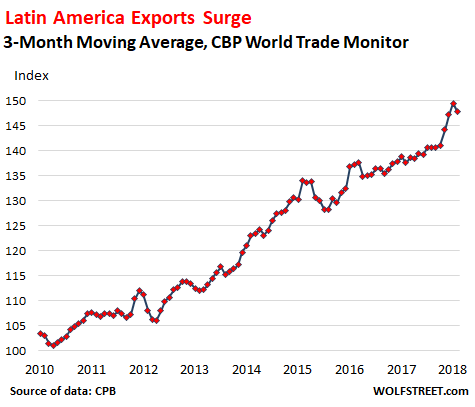World trade volume falls most since Financial Crisis.
World trade volume, which had been growing at a strong pace last year, peaking at 5.6% year-over-year growth in October, started turning down in November, and by February — according to the Merchandise World Trade Monitor, released today by CPB Netherlands Bureau for Economic Policy Analysis — it was down 3.4% from the peak in October and down 1.1% from February a year earlier.
The less volatile three-month moving average sank for the fourth month in a row, and is down 2.4% from the October peak and down about 1% from a year earlier. This kind of decline in world trade just hasn’t happened since the Global Financial Crisis:

The biggest culprits: Imports and exports by China and the emerging Asian economies of Hong Kong, India, South Korea, Indonesia, Malaysia, Taiwan, Thailand, the Philippines, Pakistan, and Singapore. China is by far the largest economy in this “Emerging Asia” and by far the largest importer and exporter.
Exports by this economically vast and rapidly growing region fell 8.3% in February from a year earlier, after having zigzagged lower for months, according to the World Trade Monitor. This data is volatile with large month-to-month ups-and-downs. The three-month moving average, which smoothens out some of that volatility, dropped 5.6% from a year ago:

Imports by China and the rest of Emerging Asia fell 3.6% in February, compared to a year earlier, according to the World Trade Monitor. The three-month moving average dropped 2.8% from a year ago and was back at the level of November 2017:

“Emerging Asia” is dominated by the giant economy of China. And these falling imports add to the signs of suddenly and sharply weakening demand in China. But part of the imports are materials and components that go into goods to be exported, and the decline in exports from the region says a thing or two about demand from outside the region.
US trade growth is split. And there is nothing unusual in the charts. The index for imports by the US, after hitting a record in December, dropped in January and inched down further in February. In terms of the three-month moving average, the index for imports in February was just a tad off its all-time high in January, and up 2.3% year-over-year.
But the US index for exports had peaked in June 2018 in terms of its three-month moving average, and as of February was 2% below that peak. This decline was only about half the decline in 2015 and 2016.
Eurozone trade is stagnating. Imports have been stagnating since about November 2017, with the three-month moving average going up and down within a tight range. In February, it was up just a tad from a year ago.
Eurozone exports peaked in January 2018, then dropped and have been stagnating in a tight range, with the three-month moving average down a tad year-over-year and is 1% below its peak of January 2018.
Japan trade is in a down-trend. The index for imports by Japan has dropped four months in a row. The three-month moving average is now a tad below where it was a year ago.
The index for exports by Japan peaked in January 2018 and has trended down since then, with the three-month moving average in February down 2.6% from that peak.
Latin America imports strong, exports surge. The index for imports into the region, after setting a new record in January, dipped in February. The three-month moving average of the imports index also set a record in January and dipped in February.
Exports have been rising solidly since April 2017 but then in August 2018 started spiking. The three-month moving average, after a record January, dipped in February, still the second highest value of the index. This spike through January is extraordinary since the Financial Crisis:

So what is going on here, with Asia trade dropping steeply, as exports from Latin America are spiking? One of the possibilities is that Latin America, particularly Mexico, is starting to pick up some of the trade the US had with China.
But Latin America’s trade strength is only a smallish factor in the global scenario. And at the global level, trade is skidding, despite strength in some corners, and possible shifting of trade from one region to another.
So each country and each economic region has its own dynamics. But of the four largest economic areas, US trade is the cleanest dirty shirt, so to speak with a mixed performance, while Eurozone trade is stagnating, Japan’s trade is in a down trend, and Emerging Asia’s trade is declining at a worrisome pace.
Enjoy reading WOLF STREET and want to support it? You can donate. I appreciate it immensely. Click on the mug to find out how:
![]()


As China’s middle class begins to grow with the increasing standard of living wages increase and the nation is not as competitive as a manufacturing exporting behemoth. Even though they are still the world’s factory.
In addition new factories are much more reliant on machine labor and ironically the engineers necessary to run them are expensive to hire.
This is part of the reason why China has been expanding into Africa to secure strategic resources, but that’s a discussion for another day.
If you were running a company in China, and you heard the bellicose rhetoric for the last two years from Washington, what would you do? Configure for manufacturing for a domestic market, and find domestic sources of what you need to build it. If a future of shipping to America looked doubtful and full of tariffs, and if you felt your supply chain was vulnerable, then any good businessperson would simply adjust.
For a bunch of commies they turned out to be pretty good capitalists, complete with the usual awesome lethal externalities and gross inequality. Must be the built-in political repression. They certainly lack the vast overhead inherent in massive military imperialism, leaving plenty of room for their modern infrastructure (largely absent in the US), so important in contemporary economic dominance.
Perhaps communism and capitalism have more in common than corporatists are prepared to admit. It would explain why so many US corporations set up shop there, particularly the labor policies.
If you’ve ever seen the Great Wall it becomes clear why they were hired to do your railroads, what’s left of them.
US Firms setup shop there cause of interest rates earned with guaranteed higher growth rates… China exports deflation and imports inflation, deglobalisation and higher wages then elsewhere, no longer the cheapest cost in South Asia, is gonna make a turn around not happening anytime soon, they will eventually reach a systemic collapse, a depression…
They are willing to operate at a loss for US Dollars, as long as they can maintain a surplus, it’s not game over for the system but inflation will be high… When they eventually run out of US dollars, start defaulting on US Issued debt, then it’s game over. Global recession regardless of what is going on elsewhere
Excellent Article btw
=>Global recession regardless of what is going on elsewhere
Capitalism as practiced in particular, and modern human practice generally, are categorically unsustainable on many levels. Eventually it will all collapse. It is certain. You’re watching it happen. TPTB hope to win in this global version of musical chairs, presuming there might still be one or two seats left when the music stops. False hope lies with the salvation of the very technologies which accelerate the process. Why, when the situation is so clear and alarming, does it remain so stubbornly intractable to change? It is because those who have power in the world want it to be this way. Huis clos. Sorry.
Stalin affirmed that part of communism’s aim was to eliminate unemployment, as unemployment was a tool of repression forcing down the value of labour. So if you take China USA you end up with a picture of mass industrial employment in China and in the USA the unemployment that capitalists are said to welcome and take advantage of. Some kind of borg, given that the USA is profiting (or “profiting”) from the labour of developing countries it communes with … or a win win on the path to labour becoming surplus and capitalism walking out with its head held high while dishing out free money as the curtain closes. Will probably all go to sh*t though as usual, leaving a few clear winners, who are those that survive.
Personally I am happy enough when I am not employed by another, and especially if by force or coercive artífice of whatever kind, hence the call for decentralisation which inevitably corrupts everything once it itself becomes corrupt, if it ever wasn’t. People rarely see the weaknesses in a system that still somehow provides, especially when it becomes so complex as to be beyond understanding…just add more money I suppose.
” [as centralisation] inevitably corrupts everything once it itself becomes corrupt… ” is what was meant.
Unamused and Wolf
Sorry for coming so late to this party, but the flip side to the Chinese railway workers was that they were BETTER OFF working for American or Canadian railways than if they had stayed in slavery in China. Many Chinese lived in squalor because they sent all their earnings (in gold, silver and jade) back to China.
As to the current decline in China imports and exports, I believe it all is the direct result of Trump having the courage to represent the American Middle Class (whatever his motives are) over the “Globalist” agenda that our “betters” wanted drown us in.
Whether he succeeds over the long term is an open question, but Trump has created uncertainty in competitor nations, and certainty in the USA.
If you hadn’t notice consumer goods demand in china now, it isn’t that pretty…and it isn’t getting better…
If run a company in China right now you would be chiefly worried about two things.
Number one is the solvency of your domestic customers and vendors. This has been the problem from day one, especially when you have to deal (like it or not) with fly-by-night outfits but with debt loads getting as crushing as they are the risks of not getting paid or, even worse, not getting your parts delivered are ever-present. Solving this issue was the reason why Japan turned their sogo shosha like Mitsui Bussan and Marubeni from old fashioned trading houses into that peculiar institution they were for over three decades. I am actually surprised China didn’t copy this institution because it would fit their export-geared industrial model like a glove.
Number two is the risk your customers and partners (not merely foreign) may leave China for greener pastures. While labor costs are often cited as the first risk they are only part of the problem. The chief reasons are countries like The Philippines and Thailand offer not merely better IP protection (no mandatory “technology sharing” with local partners for example) but also big cash incentives, for example to open a factory or logistic center in a “Special Economic Zone”.
Even Chinese companies have started to take advantage of these incentives: Hisense, the State-owned home appliance manufacturer, opened a factory in Hungary to assemble refrigerators and AC units for the European market not because they fear tariffs but because the Hungarian government, under the EU-sanctioned policy of “incentivating economic development in depressed areas”, offered them cash incentives to set up shop there.
The Chinese government seems to be a step or even two behind in the race to offer these ultra-favorable conditions: the SEZ are getting a bit long in the tooth and it’s obvious bigger and bigger cash injections in the bloated domestic credit system work to a point. The race to the bottom is on.
Another possibility is Trump’s trade war is having positive impact on the US. Wow.
Trade war?? Have no care to write a book on this.
A little late, but at least we have someone willing to at least
give some resistance to the gutting of middle America.
The best thing to happen is that both parties are out in the open
for who they actually represent.
Not in need of a bridge.
Did not state republicans or democrats represent middle class.
If they did, we would have had trade agreements long ago that
would have represented the middle class.
I’ll take Trump all day long over Jeb/Hillary/Bernie/Biden…etc..
Medically it’s a sugar high for a diabetic.
Fox News couldn’t say it better.
The drivers of today’s 3.2% GDP blowout:
1) Exports … Our president’s trade war is working
2) Business investment … good for future GDP
3) Consumer spending … great news.
Furthermore, the first quarter GDP is typically the weakest of the year, this 3.2% is a huge achievement for the president … especially in the wake of a late cycle environment. If the economy stays this way until the election, which is a BIG IF, I smell a second term.
Please re-read the article. You got some things backwards on your list :-]
My consumer spending comment runs opposite to the govt report since recently retail sales printed strong … I trust retail sales.
All those people building cash
may soon have something affordable
to spend it on.
re: China
If those are the reported numbers, imagine what the real ones must be.
The real information could be pretty ugly. Other needs to look at other data to corroborate or discredit it.
President Xi Jinping is bound to want his subordinates to put the best face on it and to gaslight the audience for these data besides. People aren’t going to be nearly so unhappy with fake news as they are with bad news, so he’s highly motivated to lie. However . . .
The lie can be maintained only for such time as the State can shield the people from the political, economic and/or military consequences of the lie. It thus becomes vitally important for the State to use all of its powers to repress dissent, for the truth is the mortal enemy of the lie, and thus by extension, the truth becomes the greatest enemy of the State.
As we know, it can be deeply destructive for a country when national institutions are so deeply and deliberately corrupted to protect the financial and political interests of the president, and this also applies to China.
Unamused – “Truth is treason in an empire of lies”.
The only thing perceived as reality in America today, is a bunch of fantasies designed to hide the truth.
The American public has been brainwashed by the main stream media’s endless repetition of baseless lies.
Any attempt to awaken them from their dreamworld, is met with the most vicious of emotional blow-backs. No counter argument, no facts, just pure irrational blustering, accompanied by emotional temper tantrums.
Empires decay away.
Each rotted away from within. Morally, socially, culturally, economically, simultaneously. Internal decay, not external attack will spell the end of empire. Falling into the graveyard, like those other great nation states in history.
History promises only this for certain, we will get exactly what we deserve.
Interesting % consideration
https://chinapower.csis.org/military-spending/
Nobody cares about the numbers or “the truth” or a little corruption even, as long as their present basic needs are met, they believe that the future will somehow be better and they feel that they have a contribution to make in making that future happen.
China has the advantage that, being a communist economy and not bound by “market principles”, they can order the jobs to be created, the homes to be built, products to be available and the food to be put on the table. These are trifles to provide in an industrialised economy that controls it’s own money supply.
In that way dissent can be minimised to relatively few intellectuals and those people who care about principles – which most anyone will see as nutters and ranters anyway.
A corrupt communist economy will of course lose that advantage and eventually fail, just like a corrupt capitalist economy will.
In 1989 the National Review published a piece by Tom Bethell. The best-selling economics textbooks all wrote that the Soviet economy was doing well. Some said almost as good as that of the US.
The tout was not based upon sound economic numbers–there were none. It was founded on the notion that central planning was good and in a command society it would really work.
Keynes, in the dedication of the German version, of his main book stated that his themes would work better in a totalitarian system.
In late 1989, the locals with the advantage of at-hand adjudication took that experiment in central planning down.
The fall of the Berlin Wall was distinctive.
Hi wolf, was reading about the Hong Kong dollar pegged to the U.S. dollar. Kyle Bass of Hayman Capital wrote about it. I think oil demand will be up 1.4 million barrels according to Bob Dudley. There was no mention of oil imports or exports in your writing. Saved the article Kyle Bass wrote. Will have to read it again to try and understand. Thanks again for your writings.
Nonsense, don’t waste your time with Bass’s writings. About 5 years ago he was predicting Japan will be doomed in a couple of months.
@ Vadim
And 5 years before that Bass was predicting and betting on and making a few billion on the collapse of the mortgage bubble so he hits some and misses some.
Bass is more or less right on China, but his thesis lacks the main culprits of China upcoming Depression… From Deglobalisation to hidden debt 2-3 x bigger then debt on paper, shadow banking cut throat rates to consumers, extremely high inflation and Price to Income Ratio for Real Estate. Only thing in Bass thesis is there Foreign Reserves and RMB thesis, which is absolutely true
Like Vadim said, Bass shorted Japanese bonds and said they were collapsing… Which is fucking insane, you might as well short Microsoft bonds while your at it, no matter what the fuck happens, BoJ will always buy and support there bonds, they create the Yen, it’s literally impossible for Bonds owned by a Central Bank to default in a currency they create… And he bet against it. His returns after his subprime trade which he stole from Michael Burry, are 2 %
2 % in a bull market… You could of picked anything blind folded since 2010 and you would of got way more then 2 % returns. China is beyond fucked don’t get it twisted, but Bass is a tool
World economy is slowing. Debt saturation reached again but this time at lower rates than before. Not everything stops; just higher growth levels drop off. US multinational and domestic starting to report poor earnings. They see it coming. Will they continue to goose their share price by taking on more debt and using buybacks? I think that was one of Powell’s concerns and one of many drivers for raising interest rates.
I expect Powell will be convinced to leave things as is and let the economy worsen until the election so that Trump will get defeated. Then we will likely see ZIRP again and more QE.
If you have capital invested in China you are screwed. If most of your income comes from China trade you are screwed. What country is looking to buy other than staples at this time? (oil, food)
What country wants food grown or processed in China? Who wants China backed fiat? Countries want USD to pay on loans so that they don’t lose collateral. Repatriating gold and buying gold is another way of saying don’t-need-to-post-collateral-cause-not-going-to-be doing-much-trading.
I’ve been watching the Asia slide via Blooomberg Asia. The regional services like also CNN en español are much better than their MSM motherships, because they have reporters on the ground locally all the time, not only when there’s a catastrophe.
Observing what’s going on outside our comfort zone is very important and interesing and helps us see the whole macro picture.
“Observing what’s going on outside our comfort zone is very important and interesing and helps us see the whole macro picture.”
Now if you could get a larger % of the American population to think like that you might stop electing disasters like the current and last 2 POTUS.
I’m sorry, I can’t promise that, but there is a knowledge revolution going on. More and more people are realizing hat the isms were disastrous in the last century, and that in this one we need to find new and better ways.
√
I chuckled when I read this one on CNN Money this morning:
“The Bureau of Economic Analysis reported that gross domestic product grew at a rate of 3.2%, substantially above the projected 2.1%, buoyed by stronger state and local government spending, lower imports and business investment. ”
Let’s restate: buoyed by stronger Govt spending and lower imports….hahaha. Now, let’s go buy some more stocks. Ain’t it all grand?
Definitely writen by one of them millenial financial advisor types …
Trump just said the USA is the #1 economy in the world. Is this more front loading to stave off tariffs?
Everything will be all good again once China massively increases its exports of counterfeit products, inferior quality goods, tainted pharma drugs and fentanyl to the rest of the world.
The US is doing well (assuming, probably falsely, that the numbers aren’t diddled) because of severe capital misallocation based on huge catastrophic debt, generated by desperate top-level political miscalculation. Investors in US equities are prepared to put loads of cash into obvious money incinerators like TSLA because they’re groupthinking the risks away.
Latin America seems to be doing well because European investors appear to have been bailing out into emerging markets ahead of the coming severe decline in the Eurozone. Don Quijones focused on this phenomenon with certain Spanish banks in an article here last Thursday.
It’s not that the global economy is going rogue or breaking its programming, but because it is doing exactly what is asked of it and doing things that are unwanted and improperly anticipated. It cannot lie, but you must ask it the right questions, and people aren’t asking the right questions because they’re sure they won’t like the answers.
a) March was record stimulus in China b) US exports are primarily energy c) Latin American exports is also probably energy. Haven’t heard much about Venezuela lately? d) Tariffs are hurting US farmers e) Jobs are coming back – to Mexico and Latin America from China. US auto exports rose 10% (recent post) f) China has always wanted global market share and they are not worried about excess capacity. Credit stimulus puts a bid under US asset prices. g) If the global recession is mild, JP and DJT will take a victory lap, but XP is carrying the load. g) Don’t worry about trade numbers worry about China’s credit numbers.
China has always disguised some of their exports to usa by sending them to another country first. Fentanyl is probably not counted.
That comes in through Mexico! Ka Ching!